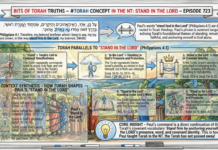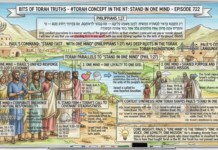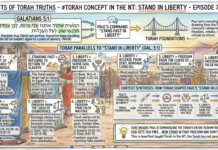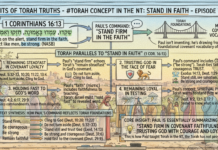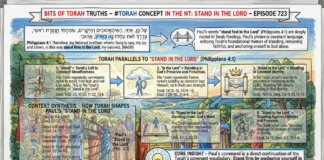Bits of Torah Truths – Torah Concept in the NT: Let Us Have Grace to Serve God – Episode 630
Hebrews 12:28
וְכֵיוָן שֶׁאָנוּ מְקַבְּלִים מַלְכוּת אֲשֶׁר לֹא תִּמּוֹט, נִהְיֶה נָא מַכִּירֵי טוֹבָה וּבְהַכָּרָה זֹאת נַעֲבֹד אֶת אֱלֹהִים כִּרְצוֹנוֹ, בַּחֲסִידוּת וּבְיִרְאָה;
#torah #torahwisdom #torahtruth #torahforlife #torah4you #torahtruth
Hebrews 12:28
12:28 Therefore, since we receive a kingdom which cannot be shaken, let us show gratitude, by which we may offer to God an acceptable service with reverence and awe; (NASB)
https://www.matsati.com/index.php/category/bits-of-torah-truths/
Hebrews 12:28 urges believers to “have grace” so they may “serve God acceptably with reverence and awe.” While the Torah doesn’t use the Greek term charis (grace) directly, it contains rich thematic parallels that reflect divine favor, reverent service, and covenantal worship. – Torah Parallels to Hebrews 12:28 – Grace as Divine Favor Leading to Service – Genesis 6:8 “But Noah found favor [ḥēn] in the eyes of the Lord.” The Hebrew word ḥēn חן (favor/grace) appears here. Noah’s reception of divine favor leads to obedient service, building the ark and walking with God which is a pattern echoed in Hebrews: grace received leads to reverent service. Exodus 33:12–17 Moses pleads for God’s favor to remain with Israel. God responds, “My presence will go with you, and I will give you rest.” This divine favor enables Israel to worship and serve God in the tabernacle, a precursor to “acceptable worship” in Hebrews. Reverent Worship and Acceptable Service – Leviticus 10:1–3 Nadab and Abihu offer unauthorized fire and are consumed. God says, “Among those who approach me I will be proved holy; in the sight of all the people I will be honored.” This underscores the need for reverence and awe in worship, exactly what Hebrews 12:28 emphasizes. Deuteronomy 10:12–13 “What does the Lord your God require of you? To fear the Lord your God, to walk in obedience… to serve the Lord your God with all your heart and soul.” This captures the essence of serving God acceptably, through reverence, love, and obedience, which Hebrews frames as empowered by grace. Covenantal Worship Rooted in Divine Initiative – Exodus 19:5–6 The covenant is grounded in divine initiative and favor, Israel is chosen not for merit but for God’s love and purpose. This echoes the grace-based relationship in Hebrews. Messianic Jewish interpretations emphasize that Hebrews builds on Torah foundations rather than replacing them. The call to “serve God acceptably with reverence and awe” reflects the Torah’s emphasis on holy worship, covenantal obedience, and divine favor, not legalism, but relational fidelity. This is how the Author of the book of Hebrews taught Torah, the Torah has not passed away!

